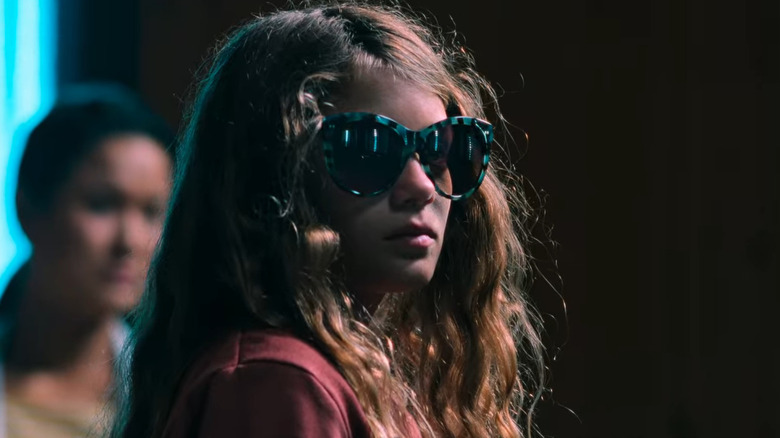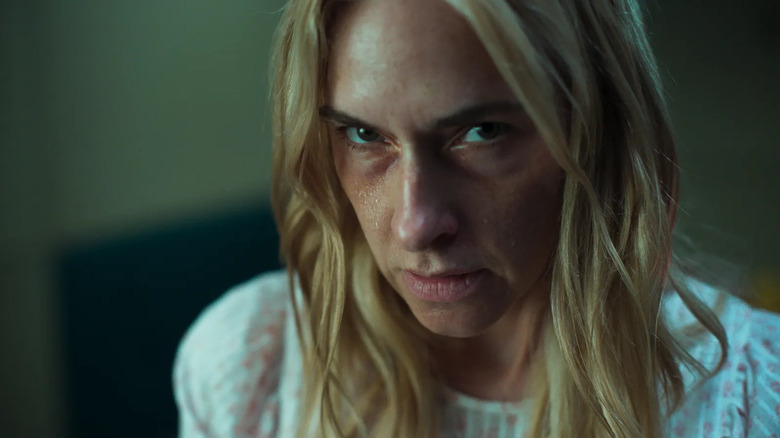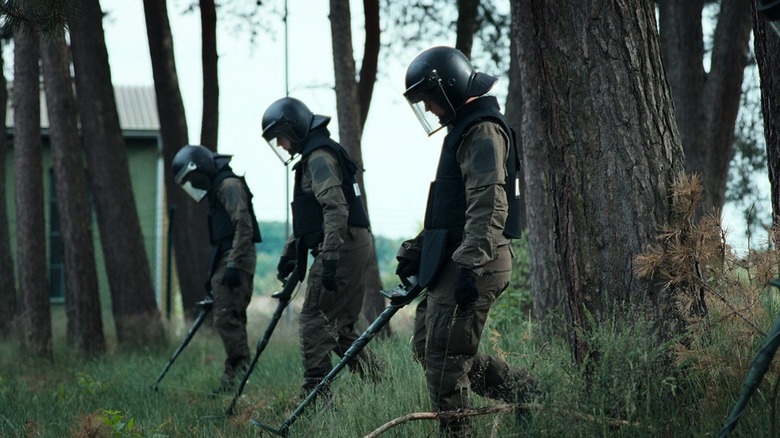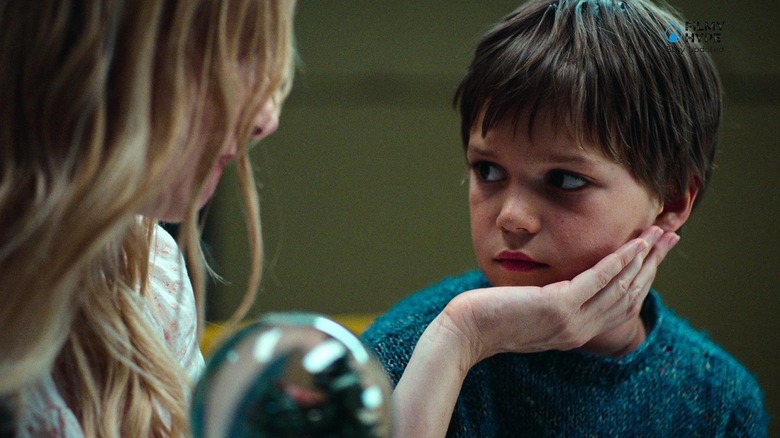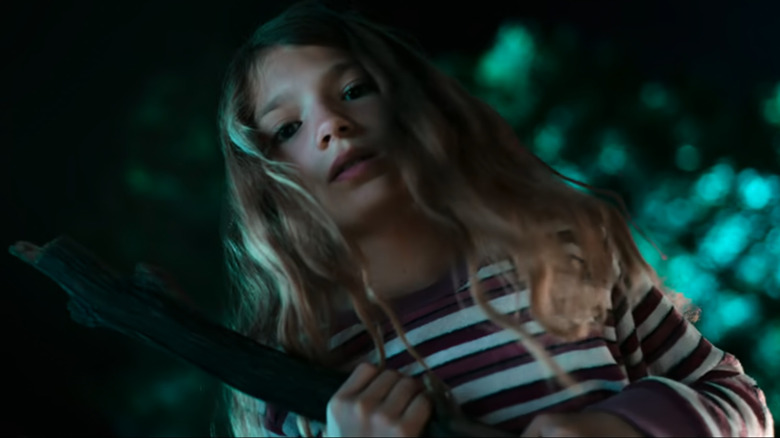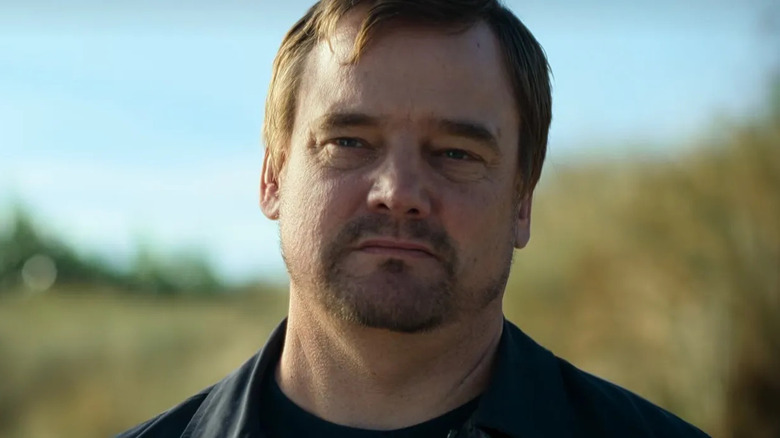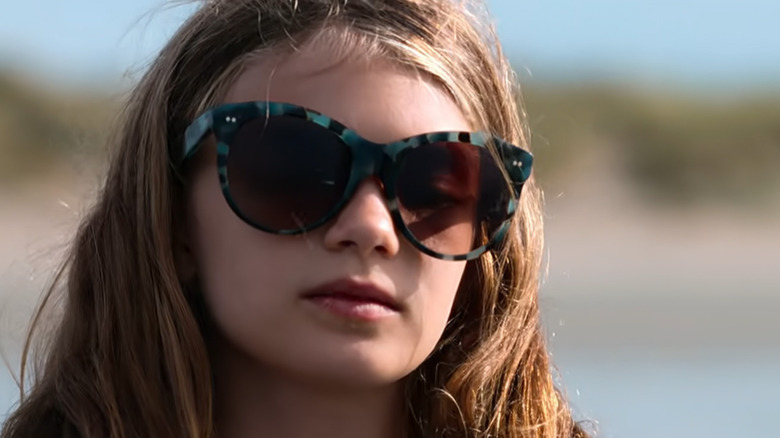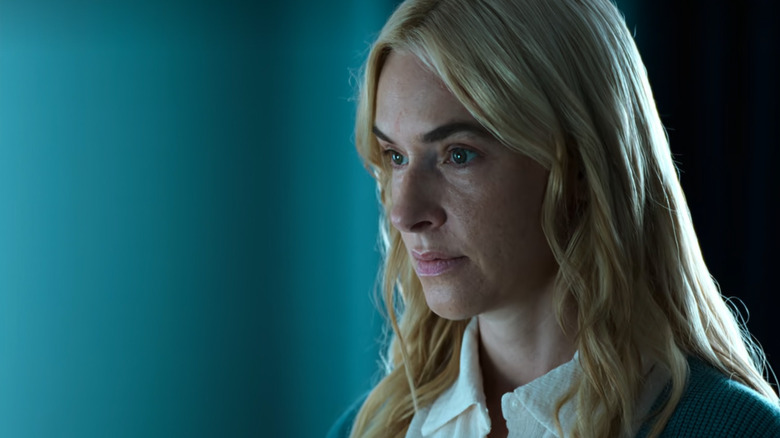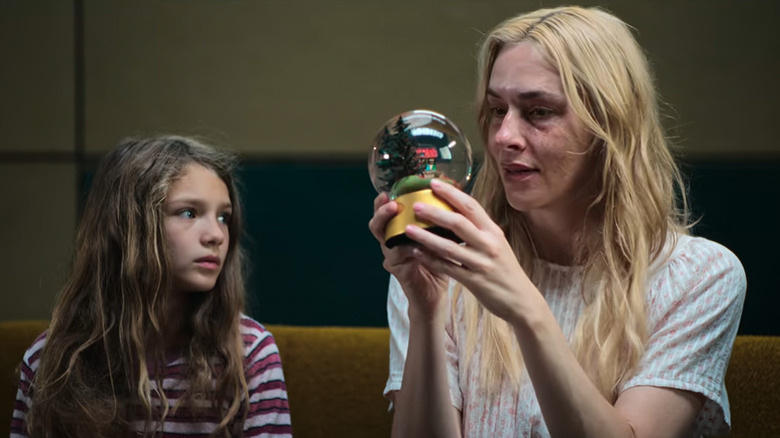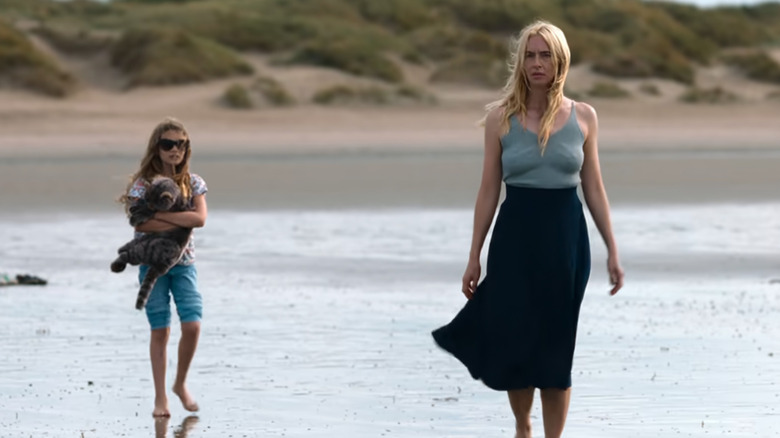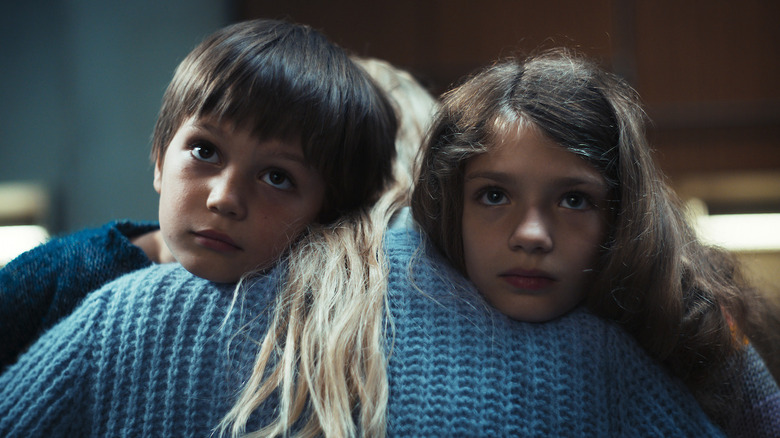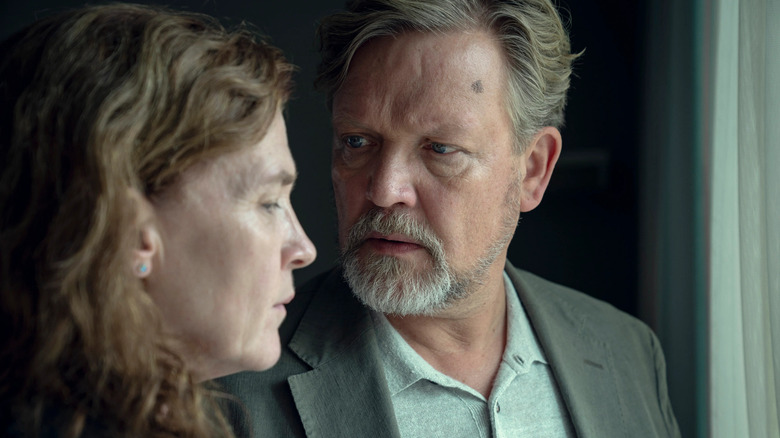The Ending Of Dear Child Explained
At the crossroads of true crime and murder mystery is "Dear Child," a 2023 Netflix original miniseries by way of Germany. It's based on a 2020 book by author Romy Hausmann and kicks off with the discovery of a woman (Kim Riedle) who calls herself Lena and is accompanied by an enigmatic little girl named Hannah (Naila Schuberth). As their situation unfolds, however, we quickly realize that the pair — ostensibly mother and daughter — are actually victims of a dangerous man who is still on the loose and who has kept them imprisoned in a remote house away from the outside world
A six-episode story, "Dear Child" opens when Lena and Hannah escape their captor, and flashbacks throughout the series give us a glimpse into their lives under the tyrannical rule of a twisted madman. But not everything is as it seems, and questions arise as to whether Jasmine and Hannah are telling the truth, and who else might be involved in their captor's crime. And when the series came hurtling to its end, shocking revelations turned the story on its head. If you're still reeling from the devastating ending, this one's for you. So prepare to untangle a web of lies and deadly crimes, as we explore the hidden mysteries and lingering questions left behind from "Dear Child."
What you need to remember about the plot of Dear Child
The mystery in "Dear Child" begins with the discovery of a seriously injured woman in the middle of the road. She's been struck by a vehicle that has apparently fled the scene, and a child found with her named Hannah claims this is her mother, Lena. But nothing about her case makes much sense: Lena doesn't seem related to the disaffected Hannah, who hints that they are victims of an unknown captor. Worse yet, Hannah says she has a little brother, Jonathan (Sammy Schrein), who is still at home and may be in danger.
Meanwhile, Dusseldorf police officer Gerd Bühling (Hans Löw) arrives believing that the injured woman may be a kidnapping victim he has been looking for for the past 13 years. With him is Karin (Julika Jenkins) and Mattias Beck (Justus von Dohnányi), who believe Lena is their long-missing daughter — and possibly Hannah's biological grandparents. When Lena awakes, though, there is doubt cast on her identity.
The only suspect, meanwhile, seems to be the employee of a nearby security agency whose criminal record includes stalking women years before. With Bühling's help, lead detective Aida Kurt (Haley Louise Jones) tries desperately to catch a kidnapper who may be looking for new victims. Meanwhile, the Becks struggle to find justice and make sense of their new life with Hannah, who strangely doesn't seem interested in rejoining her real family.
How the investigation unfolded
A call from an unknown good samaritan is what sent an ambulance to pick up known as Lena after she'd been struck by a car. Investigator Kurt's search for information is complicated by Bühling, who has brought Mattias and Karin Beck to the hospital. They quickly determine that the woman is not their daughter Lena at all. Eventually, the woman awakes and though she at first insists she is Lena, she eventually reveals that her name is Jasmin Grass. Jasmin had been abducted five months earlier to serve as caretaker for her kidnapper and two young children who called her their mother.
During their investigation, Bühling and Kurt head to a structure on a military base thought to be housing Hannah's brother, but one of Kurt's men is critically wounded when the property is found booby-trapped with explosives. Inside, they discover Jonathan alive, as well as a mutilated man who they initially suspect is the kidnapper. Confusing statements from Jasmin and Hannah about the identity of the dead man make the police believe that the kidnapper is still alive, and the discovery of multiple bodies in the forest suggests whoever they are, they may be targeting a new victim as they speak. Now, it's a race against time to unravel the truth and stop the man who kidnapped Jasmin and may be the father of Hannah and Jonathan.
What happened at the end of Dear Child
As "Dear Child" reaches its sixth and final installment, Jasmin has attempted to re-enter her old life, getting an apartment that local police keep a tight watch on to ensure her safety. But Jasmin has been hearing the voice of her captor and seems compelled to find her way back into his grasp. At the same time, we realize that Hannah is simply biding her time, determined to escape her grandfather's care and reunite with the madman she believes is her father. Soon, Jasmin and Hannah both leave their new homes and wind up in the care of their abuser, who wants to take them to a new home.
Fortunately, investigator Bühling gets wind of Jasmin's flight and makes chase, following her and her kidnapper to a nearby beach. But just as he's ready to confront them, Bühling finds the man dead in the sand: He's been stabbed in the neck by Jasmin using a large shard of glass. In his final breath, the man reveals to Bühling the place where he buried the real Lena's body years ago, and the Becks are finally able to put their daughter to rest.
What really happened to Lena, Jasmin, and Hannah?
Throughout "Dear Child" we're never quite sure what happened to Lena and how Jasmin escaped. Flashbacks in the final episode shed new light on both, beginning with Lena's abduction more than a decade earlier. Taken captive and kept imprisoned, Lena Beck was already pregnant and soon gave birth to Hannah. The kidnapper fathered her second child, Jonathan, but in a disturbing twist, we learn that Lena had also given birth to a third child, Sarah. Tragically, Lena and Sarah both died when their abuser refused to get them medical attention after they became sick.
Without a dutiful captive wife, nor a mother for his children, the kidnapper abducted more women to serve him, and each either died or was killed attempting to escape. Jasmin, however, became a favorite of Hannah, who wanted a new mother just like her original. So when Jasmin tried to escape — using Jonathan's toy snowglobe to bash her captor over the head and creating the very shard of glass she'd later use to murder him — Hannah told her "papa" not to kill her, convincing him to call an ambulance for her after she'd been struck by a car.
Hannah, however, having been raised in captivity, didn't want to escape. It was Hannah who attacked the helpful good samaritan, and her papa who mutilated his face and dumped his body back at their home to later be discovered by police.
Who was Lena's kidnapper?
The mystery of "Dear Child" starts with the identity of the man who kidnapped Lena Beck and raised two young children in forced captivity. He's kept them isolated from the world, in a carefully constructed prison, and when Lena died, he abducted more women to play the role of their mother, the latest of which was Jasmin Grass. But while police had been zeroed in on security guard Klaus Reinhart of Rogners and Son security — who had a history of preying on young women — he was ultimately a red herring.
The real perpetrator of the horrendous kidnappings and murders was Lars Rogner, president of the security firm. Using his business, he's been able to keep track of his victims after they'd escaped and has slowly been luring them back into his web. He's been monitoring Jasmin — who may be pregnant with his next child — and Hannah from afar and sets his plan into motion to bring this twisted "family" back together.
The truth about Hannah's memories
One of the most perplexing mysteries of "Dear Child" is Hannah, a young girl who has lived her entire life in the clutches of a diabolical kidnapper and murderer. She's tight-lipped when we first meet her, seemingly unexcited to explore this new world after her rescue, and unwilling to even tell anyone her last name. But after she grows fond of a hospital nurse, she confides that she has memories of a childhood with her mother Lena that involve Mattias and trips to a lighthouse, which makes police suspicious of her grandfather's possible involvement in her abduction.
By the end of "Dear Child," though, we learn the truth: Hannah's memories aren't real, but simply stories that her mother had told her growing up in captivity. Her mother had drawn pictures of Mattias and told stories of trips to the beach so vividly that Hannah — not understanding the difference between stories and memories — told people they were real.
Why did Lena and Hanna go back to their tormenter?
Coming out of the horrifically abusive situation — held as prisoners by a killer — Hannah, Jasmin, and eventually little brother Jonathan — all struggle to adjust to the world after their liberation. Jonathan seems to struggle the most, unable to communicate much at all, though he does eventually form a bond with his biological grandmother, Karin Beck. Hannah, however, remains convinced that she is headed back to life with her "papa," because it's the only life she's ever known.
Jasmin has her own problems, though, that go far deeper than an unwillingness to adjust, but an inability. So shaken by her abduction and life in captivity, Jasmin is still hesitant to reveal details about her kidnapper to police when she is first rescued. And when she is released to society, she's unable to break from the carefully constructed daily routine set by her tormenter. Soon, her grip on reality begins to slip as she hears the incessant voice of her abuser repeatedly urging her to return to his side.
Eventually, Jasmin does just that and seems unable to be free of his psychological control. The truth is, though, that she went back to him for revenge, biding her time in order to kill Rogner thanks to a gift from Hannah: the shard of glass from the broken snow globe.
What was the connection between Lena and her kidnapper?
A lot of time is spent in "Dear Child" examining the trauma faced by Jasmin, Hannah, Jonathan, and Lena's surviving parents Karin and Mattias. In the end, though, it's revealed that Lena's kidnapper Lars has trauma of his own, and it's his own childhood troubles that led to his targeting Lena Beck.
During her investigation, Officer Kurt discovers that Lars was once working in a lower position at the security firm and had visited Lena Beck to fix a faulty burglar alarm. Lena apparently held a strong resemblance to Lars' mother when she was young — before she'd run off and left Lars a motherless child. Seeking to take out his childhood trauma on an innocent woman, Lars began stalking Lena, kidnapping her after she'd left a party, and keeping her captive in a secure building on a government facility his company had been hired to provide security for.
Alone and unable to escape, Lena found herself forced to dress in the same white blouse and blue skirt as Lars' mother and to provide a pair of children for him, in addition to giving birth to Hannah not long after her arrival.
What were the themes of Dear Child?
Given the disturbing story of a kidnapped woman and a pair of young children who are left traumatized by life in captivity, it's not hard to spot some darker themes at play in "Dear Child." But ultimately, the series is about more than just the appalling ordeal endured by Hannah, Jonathan, and Jasmin. Rather, the series shows how trauma can shape and destroy so many lives and keep us under its spell. "Dear Child" shows all of the work we must do to break free of that torment, even if we can never truly be rid of the pain of our past experiences.
"Dear Child" is also about redemption. Both Kurt and Bühling have deep regrets surrounding the case. For Bühling, it's his inability to find closure for the Becks for all these years after having promised to find out what happened to their daughter Lena 13 years earlier. And for Kurt, it's the guilt of having rushed into the investigation of Lena's kidnapping that critically injured one of her own men. Through saving Jasmin, Hannah, and Jonathan, though, both find atonement for their sins, while the victims, themselves, are finally able to move into a bright, but uncertain future.
What does the ending of Dear Child mean?
The ending of "Dear Child" makes a number of startling revelations. This includes the reality that Jasmin has yet to be free of her kidnapper's hold over her and that the killer himself is the product of trauma too. And what we learn from this is the cycle of abuse and generational trauma that haunts so many lives. From Lars to Lena, from Jasmine to Hannah, and even Mattias and Karin, a single trauma from decades earlier — as Lars' mother ran away from her responsibilities because she was too young to be a mother — has upended all of their lives.
Now, the trauma threatens to repeat itself as we learn that Hannah — just a little girl — has become a sinister force that has the potential for violence. We learned that it was Hannah who attacked the good samaritan and helped Lars re-capture her "mother," Jasmin, in an effort to force her back into imprisonment. The question now is whether Hannah be able to heal and stop the cycle of violence and abuse. As the series closes out we see Hannah in therapy, which is a good sign that the future may hold a glimmer of hope for them.
What the ending means for Jasmin, Hannah, and Jonathan's future
"Dear Child" doesn't answer every question, and leaves the fate of many of the characters up in the air. So what's going to happen to Jasmin, Hannah, and Jonathan? Though we're not quite sure, the ending does suggest that they'll all get some form of normality. Having gone through a traumatic experience together — even if Hannah didn't realize she was a victim and a prisoner — Jasmin and the two children have grown close enough that they are almost a genuine family unit. And when Lars is killed, it seems that Jasmin is as close to Hannah as she would be if it were her own daughter, playing on the beach.
This could mean that Jasmin, Hanna, and Jonathan will become a family one day. For now, though, it's likely that Hannah and Jonathan will join Mattias and Karin to be raised by their grandparents, ironically in the same way that Lars was raised by his father's parents. But with the Becks apparently committed to therapy — both for themselves and their two recently discovered grandchildren — it's just as possible they'll allow Jasmin to act as a mother figure for them, making her a part of their lives as everyone adjusts to a new normal.
What has the series creator said about the ending of Dear Child?
Based on a novel by Romy Hausmann, "Dear Child" was inspired by similar stories like "Gone Girl" and "The Girl on the Train." And though the Netflix series does remove some key elements from the novel, the ending largely sticks to what was on the page. When it came to crafting the ending, it may be surprising to learn that Huasmann didn't have it all planned out.
"I just set up the initial premise and try to create the characters as defined as possible," Hausmann said in an interview with BookWeb. "I make sure that my characters stay true to themselves and keep thinking back to their motivation: What are they about? What do you want to keep or bring back? What is it that drives them?... As a result, my stories basically tell themselves." When it came to "Dear Child," the very premise of the story informed how it all tied up in the end, and it was important to leave the characters as more than just survivors of trauma.
"Without giving too much away, I knew from the start I was going to write this particular epilogue because the person from whose point of view it is written shouldn't just remain a victim. I would have found that unfair," Hausmann said. And in the TV adaptation, what we're left with at the end is no longer Jasmin and Lena suffering the scars of their abuse, but two young women ready to look forward, with their own strengths to guide them.
Could there be a second season of Dear Child?
"Dear Child" is based on a mystery novel by Romy Hausmann, and the adaptation would seem to be all the story there is to tell. That doesn't mean a second season can't happen; we've seen hit shows continue stories beyond their source material before and there are plenty of loose ends left to be tied up when the final episode ends. If "Dear Child" were to continue, there are plenty of places the story could go.
Shows like "Broadchurch," for example, have solved their mystery and focused a second season on the fallout of the crime. "Dear Child" could similarly focus on the struggles of Jasmin, Hannah, and Jonathan as they try to adjust to a new life, and flashbacks to their time in captivity could provide new revelations that are a catalyst for a new mystery. At the same time, there's nothing to say that investigators Bühling and Kurt can't be working on a new case that ties back to the events from Season 1.
Given the success of "Dear Child" — where it reached a top spot on Netflix's most-watched shows even in the United States — it stands to reason that the streaming service may be considering continuing the story beyond the original novel.
